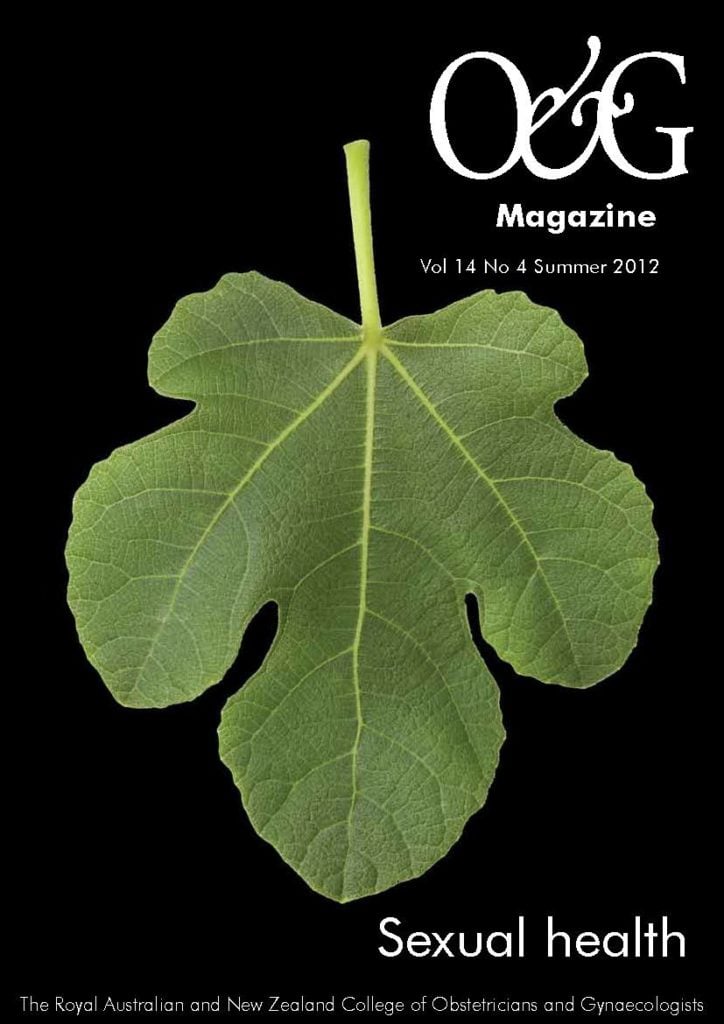Health professionals have an important role to play in providing women and their partners with information about changes affecting sexual relationships during and after pregnancy. This article provides a brief overview of some of the issues women and their partners may want information about.
Many women and their partners are under-prepared for the extent of change in their sexual relationship during and after pregnancy. Sex and intimacy, while openly discussed and portrayed in the media, remain subjects surrounded by social taboos that make it more difficult for new parents to seek (or find) information about what to expect, and whether what’s happening to them is normal. An Australian longitudinal study of over 1500 first-time mothers shows that the majority of women report a loss of interest in sex in the third trimester of pregnancy and throughout the first year after childbirth.1,2 Common sexual health issues in the postpartum period include: dyspareunia, lack of lubrication, loss of libido and increased self-consciousness about body image.2,3
Resuming sex after childbirth
Recent studies conducted in the UK and Australia show that a majority of women (60–70 per cent) delay resumption of vaginal sex until later than six weeks postpartum.1,3,4 In the Maternal Health Study conducted by our research group, younger women (under 25) having their first baby were more likely to resume vaginal sex sooner, and older women (over 34) were more likely to delay longer than six weeks postpartum. Women who had a vaginal birth assisted with forceps took slightly longer to resume vaginal sex than women who had a spontaneous vaginal birth, vacuum extraction or caesarean section. The majority of women (86 per cent) found it painful the first time they tried to have vaginal sex. This was an issue for women irrespective of method of birth: 84 per cent of women who had a caesarean section found sex painful the first time, compared with 87 per cent of women who had a vaginal birth. Most studies reporting data on timing of resumption of sex after childbirth indicate that a majority of women (between 60–80 per cent) have resumed vaginal sex by three months postpartum5-7, with few women delaying longer than six months.3

Recent research has shown that couples are often unprepared for the long-term impact childbirth has on their sexual relationship.
Dyspareunia and other sexual health issues
A UK cross-sectional study conducted by Barrett et al found that 62 per cent of women reported dyspareunia (defined as painful penetration and/or pain during intercourse or orgasm) at some time in the first three months postpartum.3 Other sexual health problems reported by women in this study were: loss of sexual desire (53 per cent of women), vaginal tightness (20 per cent), vaginal looseness or lack of muscle tone (12 per cent) and lack of vaginal lubrication (26 per cent). All of these issues were more common in the period after childbirth, than in the period preceding pregnancy.
How long do problems persist?
Few studies have collected the longitudinal data needed to answer this question. In our Australian cohort of over 1500 women recruited in early pregnancy, 45 per cent of women who had resumed vaginal sex reported dyspareunia at three months postpartum, 43 per cent at six months postpartum, and 28 per cent at one year, compared with 35 per cent reporting this symptom in the year prior to pregnancy. At 12 months postpartum, 70 per cent reported a loss of interest in sex compared with before pregnancy, 39 per cent reported lack of lubrication, 21 per cent reported vaginal tightness and 12 per cent reported vaginal laxity.
Women’s experiences affect their sexual relationships
Few studies report on what women themselves have to say about sex and intimacy after childbirth. In-depth interviews were conducted with a small sub-sample of women taking part in the Maternal Health Study when their first child was around two to three years old. Looking back on the first year, women identified a range of issues that affected their sexual relationships: including:
- chronic tiredness combined with the intense emotional connection between mother and baby, resulting in sex taking a back seat;
- marked changes in lifestyle and roles, leaving many couples feeling disconnected from each other; and
- physical changes associated with pregnancy and childbirth, leading to some women feeling unattractive and self-conscious about their bodies.1,2
Women taking part in the interviews often said that they wished they and their partners had been better prepared for what lay ahead.
Getting ‘back to normal’
The timing of the ‘six-week postpartum check-up’ has long been recognised as promoting the common misconception that things will be ‘back to normal’ by six weeks after childbirth. It is clear that for many women, loss of interest in sex and pain during intercourse may persist well beyond six weeks. The extended timeframe over which women resume vaginal sex during the first postpartum year, and the extent to which sex continues to be painful for many women throughout the first six to 12 months postpartum suggests that the first postpartum year is anything but ‘normal’ for many women.
Data reported by Australian and international studies consistently show that pregnancy and childbirth have a marked impact on sexual health and intimacy between couples. Yet, there is generally a dearth of information given to couples in pregnancy or after childbirth providing them with information about what to expect and how having a baby may impact on their sexual relationship. From the Maternal Health Study, it is apparent that many women would have liked more information and support from health professionals to deal with the impact of pregnancy, childbirth and the transition to motherhood, on their sexual and intimate relationships.
Optimal time for the postnatal check-up?
There has been much debate about this question.8,9 From the perspective of sexual and reproductive health, it could be argued that a six-week check-up is too late, especially for women requiring contraceptive advice. On the other hand, six weeks is arguably too early for a visit that traditionally marks the conclusion of maternal postpartum healthcare. For the 60 per cent of women who have not resumed vaginal sex by six weeks postpartum, the questions they may want to ask once they do will need to be brought up in other consultations. There is consistent evidence that maternal health problems such as urinary incontinence and sexual health issues are under-reported and under-recognised by health professionals in the first postpartum year.10 A large cluster randomised trial of redesigned postnatal care in the UK incorporated a handover from community midwife care to GP care at 12 weeks postpartum.11 An Australian trial of a late postpartum check-up (for example, at three to six months postpartum) is worthy of consideration.
Information for new parents from Mitec Medical Publishing
Woolhouse H, McDonald E, Brown S. Sexual health and intimacy after childbirth. The impact of pregnancy, childbirth and parenting on sexual health and intimacy. Healthy Mothers Healthy Families Research Group, Murdoch Childrens Research Institute, Melbourne, 2009.
References
- Woolhouse H, McDonald E, Brown S. Sexual health and intimacy afterchildbirth. A report from the Maternal Health Study. Healthy MothersHealthy Families Research Group, Murdoch Childrens ResearchInstitute, Melbourne 2009.
- Woolhouse H, McDonald E, Brown S. Women’s experiences of sexand intimacy after childbirth: making the adjustment to motherhood.J Psychosomatic Obset Gynecol 2012; Early Online 1-6; DOI:10.31099/0167482X.2012720314.
- Barrett G, Pendry E, Peacock J et al. Women’s sexual health afterchildbirth. BJOG 2000;107:186-195.
- Andrews V, Thakar R, Sultan AH, Jones PW. Evaluation of postpartumperineal pain and dyspareunia – a prospective study. Eur J ObstetGynecol Reprod Biol 2008;137:152-156.
- Adinma JIB. Sexual activity during and after pregnancy. Advances inContraception 1996;12:53-61.
- Elliot S, Watson J. Sex during pregnancy and the first postnatal year.J Psychosomatic Res 1985;29:541-548.
- Van Brummen HJ, Bruinse HW, van de Pol G et al. Which factorsdetermine sexual function one year after childbirth? BJOG2006;113:914-918.
- Gunn J. The six week postnatal check up. Should we forget it? AustFam Physician 1998;27:399-403.
- MacArthur C. What does postnatal care do for women’s health?Lancet 1999;353:343-344.
- Brown SJ, Lumley J. Maternal health after childbirth: results of anAustralian population based survey. BJOG 1998;105:156-161.
- MacArthur C, Winter HR, Bick DE et al. Effects of redesignedcommunity postnatal care on women’s health 4 months after birth: acluster randomised controlled trial. Lancet 2002;359:378-385.






Leave a Reply